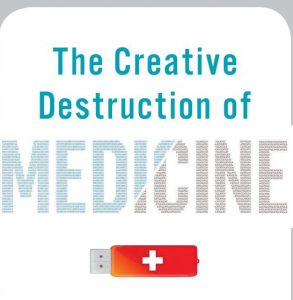If one more person had said “Have a magic day” I might have hit them. I’ve been in Hong Kong for a night staying at the Disneyland Hotel. Mickey Mouse in Cantonese and Mandarin is somewhat weird. Anyway, amongst other things, I’m putting the finishing touches to a new book called The Future: 50 Things You Really Need to Know. Here’s what used to be the end before it got thrown out (I hate throwing things away, which is why have a habit of recycling them here).
—
Ideas can be tricky in the sense that they often combine in novel and unexpected ways. Thus, the future rarely ends up as a logical extension of our current thinking. Some ideas will move much faster, or much slower, than we expect, either because we will underestimate the speed of technological change or because we will forget about the impact of human psychology and the inertia of history. This latter point is hugely important. Futurists, especially techno-optimists, often focus on technology at the expense of other important factors, especially the psychology of their fellow human beings, many of whom can be emotional, subjective, irrational, forgetful and stark raving mad.
Therefore, while science and technology will exert significant influence on the future, other, more prosaic, ideas or events may prove to be far more influential, especially when they combine with inherently human responses. For example, it is likely that machines will one day become smart enough to replace people in many more roles. At this point capital effectively becomes labour. But what will the human reaction to this situation be? Similarly, a major man-made or natural disaster could trigger a seemingly illogical technological regression, while a prolonged economic depression might result in anger or resentment towards other nations that ends up with a steady retreat from globalisation and many of the values, institutions and beliefs that we currently take for granted.
If you are thinking that this all sounds a little unlikely and that the future will most probably be a predictable and logical extension of the present, then consider what a handful of men armed with a simple idea, together with some low-tech box cutters and a rudimentary knowledge of flying, managed to do to geopolitics, US military deployment and the global zeitgeist on 11 September 2001.
We might also find that many of our new ideas, especially major scientific and technological breakthroughs that would benefit mankind, are constrained, modified or rejected by large numbers of people in favour of illogical beliefs and superstitions. Rather than a new enlightenment, we may enter a new dark age where it is illogical beliefs, rather than facts, that flourish. Again, you might believe that this future is implausible, but it’s already happening in some regions where the teaching of evolution is being rejected , either in favour of the balanced teaching of various viewpoints, or because religion considers such ideas to be dangerous and subversive.
Or perhaps we will abandon the internet, either because we no longer trust much of the information it contains, or because governments, or corporations, around the world start to censor it or remove many, or all, of its open and generative qualities.
We should also remember that important things happen by accident and that people often find uses for ideas that their creators did not foresee. Sending texts via mobile phones is just example of the unintended consequences of technology. Similarly, Twitter was largely created ‘on the fly’ by its users and not the unfolding of a long-term master plan. We often make long-terms plans based on an imagined future, but life then makes unexpected and unwanted turns. The challenge, to some extent, is dealing with the realities that we get rather than those we expect. Life, as John Lennon said, is what happens to you while you are making other plans.
It would also be a mistake to assume that the future will be a singular experience. Some people will experience the future sooner than others, which is much the same as saying that how you experience the future, 5, 15 or 50 years hence, will to a large degree, depend upon what age you are, where you live and what you spend your time doing. There is also the point made about prophesy by the philosopher Karl Popper many years ago, which is that the future is dependent upon the growth of knowledge, which is itself unknowable or, at the very least, unpredictable.
To conclude, the only thing that we really know about the future is that it will be different. Nothing is inevitable and equally nothing will happen in isolation.
Overall, the future offers us many wonderful possibilities, but it remains up to us whether the opportunities are embraced, squandered or ignored. The future is already here, but it’s unclear what we’ll decide to do with it.
Should we be optimistic about the future? On balance, the answer is probably yes. In the shorter term there are serious issues on the horizon and everyday life is likely to get more difficult for many people, especially in relation to food, water, energy and resources. Mankind also has a habit of doing the wrong thing at the wrong time, often due to short-term pressures, or messing things up completely by leaving things until it’s too late. But we usually muddle through and eventually fix any serious wrongdoings.
Over the longer term things are looking brighter, largely due to forthcoming developments in areas such as healthcare, energy and the Internet. These changes won’t benefit everyone, so one of the key challenges is to ensure that any newfound optimism is evenly distributed and that more of the world’s people can engage in a debate about what kind of future we would all like to live in.





